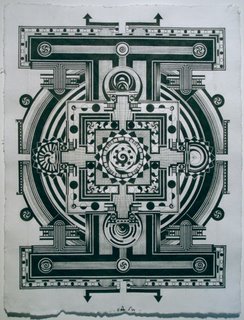Jason Hughes's Cleanly Doors*
 In one of his graphite on paper drawings, artist and curator Jason Hughes depicts three doors. What is interesting about these doors is that we cannot be sure whether we are on the inside of whatever structure the doors are affixed to, or on the outside. There is no context for them, no walls, no room, no other element with which we may situate ourselves. The result is that, as we look at the drawing, we can imagine ourselves positioned within, or without, any number of spaces, the hallway of some dingy office building, an alley outside a department store, the conference room of some old downtown hotel. The doors invite us to use our memories and imagination to develop any kind of environment we might wish.
In one of his graphite on paper drawings, artist and curator Jason Hughes depicts three doors. What is interesting about these doors is that we cannot be sure whether we are on the inside of whatever structure the doors are affixed to, or on the outside. There is no context for them, no walls, no room, no other element with which we may situate ourselves. The result is that, as we look at the drawing, we can imagine ourselves positioned within, or without, any number of spaces, the hallway of some dingy office building, an alley outside a department store, the conference room of some old downtown hotel. The doors invite us to use our memories and imagination to develop any kind of environment we might wish.This inside-outside dichotomy is central to much of Jason's work. As he says, "I am very interested in space and how I can take something from the psychic realm and push it into a physical experience." In other words, in his drawings, which have a very sculptural quality in and of themselves—a
 n examination of space in two dimensions—Jason is interested in exploring his inner landscapes, his thoughts, ideas, and emotions, and giving them form in the physical realm of art. Another of his drawings, "Crossing Paths," demonstrates this very well. The drawing shows the convergence of two grassy paths, that is, a landscape, with a ladder descending into a hole at the work's center. At the time he made the drawing, Jason told me, he was coming to grips with his anxiety about his ability in representational drawing, whether he could contend with his peers in this important skill. The picture then is a careful portrait of his emotional state, the outside pressures of his art world reputation converging on his feelings of adequacy, as well as a depiction of his decision to climb inside himself and deal with these fears.
n examination of space in two dimensions—Jason is interested in exploring his inner landscapes, his thoughts, ideas, and emotions, and giving them form in the physical realm of art. Another of his drawings, "Crossing Paths," demonstrates this very well. The drawing shows the convergence of two grassy paths, that is, a landscape, with a ladder descending into a hole at the work's center. At the time he made the drawing, Jason told me, he was coming to grips with his anxiety about his ability in representational drawing, whether he could contend with his peers in this important skill. The picture then is a careful portrait of his emotional state, the outside pressures of his art world reputation converging on his feelings of adequacy, as well as a depiction of his decision to climb inside himself and deal with these fears. In the same vein, Jason's curatorial work at Maryland Art Place is interested in the interaction between our inner and outer environments. The show, "Material Matters," is a critique of our consumerist society and how we both shape it and are shaped by it. "The ideology behind consumerism," Jason writes in the show's catalogue, "innately manipulates our wants as needs in order to temporarily pacify our internal struggles and insecurities, while embracing us through a manufactured 'consumer' identity. In so doing, we become complicit, indifferent, or totally naive as to how our choices and habits affect our personal lives, the greater community, and entire cultures."
In the same vein, Jason's curatorial work at Maryland Art Place is interested in the interaction between our inner and outer environments. The show, "Material Matters," is a critique of our consumerist society and how we both shape it and are shaped by it. "The ideology behind consumerism," Jason writes in the show's catalogue, "innately manipulates our wants as needs in order to temporarily pacify our internal struggles and insecurities, while embracing us through a manufactured 'consumer' identity. In so doing, we become complicit, indifferent, or totally naive as to how our choices and habits affect our personal lives, the greater community, and entire cultures."
This interaction of our "manufactured identify" with the greater community is assessed in such works as Walterio Iraheta’s "Kryponita," an at once humorous and scathing look at the iconography of Superman and the way it has changed and been manipulated, and in Cliff Evans' video installation, "The Road to Mount Weather," a mesmerizing and unsettling animated collage of images taken from the Internet. These pieces, as well as works by many other local, national, and international artists, attempt to unveil the sometimes too well-hidden consequences our materialist mindset. As such, the art works not only as doorway between our own personal worlds, but between our Western society and that of the developing world.
 That art can function as such a doorway is important to Jason, as we can see by looking at both his own art and that of "Material Matters." However, it is important to note Jason's interest in the primacy of the artwork itself, its physical form. As he told me, "Finding a way through the visual medium is the most important way of connecting with the arts. It's one thing to say what [an art piece] is about, but does it come through in the work?" The ideas, the politics, the conception of a drawing or sculpture are interesting and integral, they provide its contextual background, but the work itself should convey these elements through its use of color, shape, line, texture. And just as important is the question of whether the work is visually arresting, whether it can draw the eye. "I'm a very visually oriented person," Jason says. "I wanted to work with artists [for "Material Matters"] who are very much a part of producing a visual experience."
That art can function as such a doorway is important to Jason, as we can see by looking at both his own art and that of "Material Matters." However, it is important to note Jason's interest in the primacy of the artwork itself, its physical form. As he told me, "Finding a way through the visual medium is the most important way of connecting with the arts. It's one thing to say what [an art piece] is about, but does it come through in the work?" The ideas, the politics, the conception of a drawing or sculpture are interesting and integral, they provide its contextual background, but the work itself should convey these elements through its use of color, shape, line, texture. And just as important is the question of whether the work is visually arresting, whether it can draw the eye. "I'm a very visually oriented person," Jason says. "I wanted to work with artists [for "Material Matters"] who are very much a part of producing a visual experience."For Jason, who believes there is often a disconnect between the art world and the general public, this highly visual quality of art can serve as a way to democratize the arts, to make art that is, as Jason has written, "procreated on an egalitarian level." The kind of art in which care has been taken to open the door between thought and design will stand the greatest chance of drawing interested viewers. We may come away from such art changed, thus changing the world in which we live.
* * *
*"If the doors of perception were cleansed every thing would appear to man as it is, infinite."
--William Blake
Photo of Jason, Michael Cantor; "Shanty Mall," Simón Vega; all other works, Jason Hughes

9 Comments:
Good writing and an interesting man. What a terrific series this has been. I look forward to more.
Thanks, Leslie!
Oh yeah!
Jason Hughes's work is amazing! Today, when world leaders meet with famous actors and rock stars, it seems to bridge some gap between pop culture and politics. This is just fine. However, if powerful U.S. bipartisan leaders were to meet more frequently with people like Jason Hughes they could gain some perspective.
Thanks so much for this post!
Thank you, Jim, for reading.
Jason, your work is only getting better! I wish I could have made it to the MAP show, but I was there in spirit. God opens doors, - Stefanie
So great to read this. I own "Three Doors" so it was great to have another perspective on this drawing that one day feels full of potential and possibility and on another day feels like the classic "Lady and the Tiger" story.
Thanks for an insightful feature on a wonderful and promising artist and curator. - Andrea
Thanks so much for visiting, Stefanie and Andrea.
"The ideology behind consumerism," Jason writes in the show's catalogue, "innately manipulates our wants as needs in order to temporarily pacify our internal struggles and insecurities, while embracing us through a manufactured 'consumer' identity. In so doing, we become complicit, indifferent, or totally naive as to how our choices and habits affect our personal lives, the greater community, and entire cultures."
I am in love with this man!! OMG!! how freaking fantastic is this?? wow Joe, and your writing, as I told you, I so look forward to reading these, thank you so much, I love this..oh yes..xoox P
Glad you are continuing to enjoy the pieces, Patricia. Means a lot to us.
Post a Comment
Subscribe to Post Comments [Atom]
<< Home